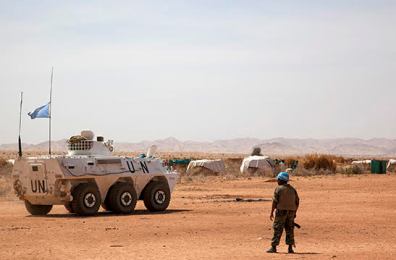UN refuses to sign agreement on UNAMID’s exit strategy: Sudan
June 15, 2015 (KHARTOUM) – The Sudanese government said the United Nations has retracted from an agreement reached by the tripartite team on an exit strategy for the hybrid peacekeeping mission in Darfur (UNAMID).

The head of the tripartite team from the Sudanese side, Jamal al-Sheikh, told reporters on Monday they reached an agreement on the report of the exit strategy but he was surprised by the refusal of the UN representative in the team to sign it.
Al-Sheikh said the refusal came as a result of the UN headquarters attempt to impose a specific agreement that has been rejected by the team, noting it doesn’t have the legal or procedural right to interfere in the work of the team during the current phase.
In a report to the UN Security Council (UNSC) on 26 May, the UN chief, Ban Ki-moon said that no agreement on the exit strategy of UNAMID has been reached yet by the tripartite team, adding that the team’s meetings were suspended and are supposed to resume later this year.
Ki-moon further said that UNAMID suggested during the negotiations to withdraw gradually from West Darfur, and leave from three bases in North and South Darfur, in areas that do not currently necessitate its presence, noting that withdrawal from other areas would only be possible if a ceasefire and protection of displaced are ensured.
Following a meeting of the foreign ministry’s undersecretary with ambassadors of the UNSC permanent members in Khartoum, al-Sheikh said that the report of the tripartite team, after it is signed, should be submitted to the three parties, noting that New York’s intervention is not legally, ethically and procedurally right at this juncture.
He said the team’s meetings were suspended following the UN’s refusal to sign the report and denied that the mission of the team has been terminated, adding the move must be decided by agreement of the three parties.
The Sudanese diplomat further said the statements of the UN chief regarding the failure of the team to reach an agreement as “incorrect”, and revealed the refusal of the African Union Security and Peace Council (AUSPC) for a recommendation to extend UNAMID’s mandate without modification, for the next 12 months, until 30 June 2016.
For his part, the spokesperson for the foreign ministry, Ali al-Sadiq, said the ambassadors of the UNSC permanent members admitted that UNAMID must eventually exit and that there is no disagreement on the exit strategy.
UNAMID deputy joint special representative Abdul Kamara was summoned by Sudan’s foreign ministry last Thursday to inform him of the government discomfort and disappointment of false and erroneous information contained in Ki-moon’s report.
Also, the Sudanese deputy ambassador to the UN, Hassan Hamid Hassan, on Wednesday accused the UN secretary-general and the UN peacekeeping department of seeking to provide a distorted picture about the security situation in Darfur. He criticized the assistant secretary-general for peacekeeping operations for attributing the recent displacement of civilians, which is caused by the tribal clashes, to the government military campaign on rebel groups.
The hybrid mission has been deployed in Darfur since December 2007 with a mandate to stem violence against civilians in the western Sudan’s region.
It is the world’s second largest international peacekeeping force with an annual budget of $1.35 billion and almost 20,000 troops.
(ST)
